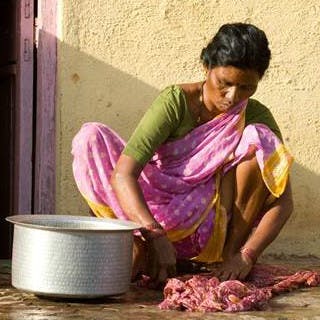
Editor’s Note: This post is part of the blog series, “Her Goals: Our Future,” which highlights the connections between girls and women and the Sustainable Development Goals. Guest blogger views expressed here do not necessarily reflect the views of the UN Foundation.
This is an important year for global development: It marks the first full year of global goals, which are set to be completed by 2030. The first set, the Millennium Development Goals, had immense success in urging global progress on important areas like primary school enrollment, malaria reduction, and maternal mortality.
The plan for the next 15 years not only focuses on the needs of women and girls in a stand-alone gender goal, but their unique needs, challenges, and opportunities are woven throughout the entire set of goals, including Goal 8, which commits to: “Promote inclusive and sustainable economic growth, employment and decent work for all.” That the goal says “for all” is important, particularly as women disproportionately concentrate in informal, contingent, and poorly paid work. A recent UN report (2015) underscores that only 50% of the world’s women are engaged in work in the formal economy, as compared to 77% of men.
Part of the explanation lies in women’s and girls’ greater responsibility for caring for children, the sick, and the aged, for washing clothes, fetching water and fuel, and cooking and cleaning for the household. Across the globe, the burden of unpaid care work falls disproportionately on girls and women,and is particularly acute in developing countries in rural settings, in contexts with poor infrastructure, inadequate roads and transport, and a lack of access to domestic energy and water. The total time spent by women on paid and unpaid work exceeds that of men in all regions. The amount of time dedicated to both paid and unpaid work also rises with growing numbers of single-parent households headed by women, and in ageing and post-conflict societies and under conditions of environmental stress.
Women’s longer work hours start early in life: Girls take on responsibilities at home such as cooking, cleaning, and caring for siblings, and the time spent doing these tasks often limits girls’ ability to attend and complete school. In conflict-affected contexts, girls are 2.5 times more likely to be out of school than boys, and young women are nearly 90% more likely to be out of secondary school than their counterparts in countries not affected by conflict. Each additional year of schooling past the fourth grade increases a girl’s future wages by almost 12%; this rises to 15-25% for secondary school.
Globally, 62 million girls who should be in school are not, which is an enormous missed opportunity for them, their communities, and future generations. Not only does lack of education prevent girls from achieving their full academic, economic, and political potential, this deficit is passed on to their children, perpetuating the intergenerational cycle of poverty.
A child born to a mother who can read is 50% more likely to survive past the age of 5 than a child born to an illiterate woman. Yet education alone is not enough. For real change to occur, we must also address care deficits, and the way society values care work. Investing in solutions that recognize, reduce, and redistribute care work between men and women, the market, and the state, will be part of valuing care work and promoting greater substantive gender equality. These solutions will include small infrastructure, rural electrification, and piped water. They will also require adequate social protection for all workers, and for children, the sick, and the aged, as well as access to health care.
By addressing the unpaid care work that so many women and girls are compelled to undertake we can achieve the Sustainable Development Goals and reduce poverty, increase access to education, and sustain economic growth to drive progress.
By Sarah Gammage, Director of Gender, Economic Empowerment and Livelihoods and Lyric Thompson, Senior Policy Manager, International Center for Research on Women (ICRW)
[Photo: David Snyder/ICRW]

